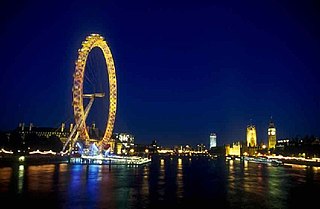Related Research Articles
A golden jubilee marks a 50th anniversary. It variously is applied to people, events, and nations.

An oath of allegiance is an oath whereby a subject or citizen acknowledges a duty of allegiance and swears loyalty to a monarch or a country. In modern republics, oaths are sworn to the country in general, or to the country's constitution. For example, officials in the United States, take an oath of office that includes swearing allegiance to the United States Constitution. However, typically in a constitutional monarchy, such as in the United Kingdom, Australia, and other Commonwealth realms, oaths are sworn to the monarch. Armed forces typically require a military oath.

The Freedom of the City is an honour bestowed by a municipality upon a valued member of the community, or upon a visiting celebrity or dignitary. Arising from the medieval practice of granting respected citizens freedom from serfdom, the tradition still lives on in countries such as the United States, United Kingdom, Ireland, Australia, Canada, South Africa and New Zealand—although today the title of "freeman" confers no special privileges. The Freedom of the City can also be granted by municipal authorities to military units which have earned the city's trust; in this context, it is sometimes called the Freedom of Entry. This allows them the freedom to parade through the city, and is an affirmation of the bond between the regiment and the citizenry.

A wedding anniversary is the anniversary of the date that a wedding took place. Couples often mark the occasion by celebrating their relationship, either privately or with a larger party. Special celebrations and gifts are often given for particular anniversary milestones. In some cultures, traditional names exist for milestone anniversaries; for instance, fifty years of marriage may be known variously as a "golden wedding anniversary", "golden anniversary" or "golden wedding".

A loyalty oath is a pledge of allegiance to an organization, institution, or state of which an individual is a member. In the United States, such an oath has often indicated that the affiant has not been a member of a particular organization or organizations mentioned in the oath. The U.S. Supreme Court allows the oath to be a form of legal document.
An oath of citizenship is an oath taken by immigrants that officially naturalizes immigrants into citizens. It is often the final step in this process, and is usually done in a ceremonial capacity. An oath of citizenship is designed to be a statement of patriotism and loyalty to the new country. In countries which retain a monarchical system of government, an oath of allegiance to the monarch is often required as well. Adding an oath to God to the end of an oath is usually optional.

The Canadian Tulip Festival is a tulip festival held annually each May in Ottawa, Ontario, Canada. The festival claims to be the world's largest tulip festival, displaying over one million tulips, with attendance of over 650,000 visitors annually. Large displays of tulips are planted throughout the city, the largest of which are often in Commissioners Park on the shores of Dow's Lake, and along the Rideau Canal with 300,000 tulips planted there alone.

The Oath of Allegiance is a promise to be loyal to the British monarch, and his or her heirs and successors, sworn by certain public servants in the United Kingdom, and also by newly naturalised subjects in citizenship ceremonies. The current standard wording of the oath of allegiance is set out in the Promissory Oaths Act 1868.

The Golden Jubilee of Elizabeth II was the international celebration held in 2002 marking the 50th anniversary of the accession of Queen Elizabeth II on 6 February 1952. It was intended by the Queen to be both a commemoration of her 50 years as monarch and an opportunity for her to officially and personally thank her people for their loyalty.
The Oath of Citizenship, or Citizenship Oath, is a statement recited and signed by those who apply to become citizens of Canada. Administered at a ceremony presided over by a designated official, the oath is a promise or declaration of fealty to the Canadian monarch and a promise to abide by Canada's laws and uphold the duties of a Canadian citizen; upon signing the oath, citizenship is granted to the applicant.

Perez v. Brownell, 356 U.S. 44 (1958), was a United States Supreme Court case in which the Court affirmed Congress's right to revoke United States citizenship as a result of a citizen's voluntary performance of specified actions, even in the absence of any intent or desire on the person's part to lose citizenship. Specifically, the Supreme Court upheld an act of Congress which provided for revocation of citizenship as a consequence of voting in a foreign election.

The bi-metallic Thailand ten-baht coin is a denomination coin of the Thai baht, the currency unit of Thailand.

A flypast is a ceremonial or honorific flight by an aircraft or group of aircraft. The term flypast is used in the United Kingdom and the Commonwealth. In the United States, the terms flyover and flyby are used.
In Australia, an Oath of Allegiance or an Affirmation of Allegiance are oaths of allegiance required to be made to the monarch of Australia in some situations. Oaths of Allegiance are usually made on a Bible, or some other book holy to the person, such as a Torah or Koran; but the person may opt to make an affirmation in lieu of an oath. This oath is not the same as the Australian Citizenship Pledge which is required to be made when being naturalised as an Australian citizen.

Honorary citizenship is a status bestowed by a city or other government on a foreign or native individual whom it considers to be especially admirable or otherwise worthy of the distinction. The honour usually is symbolic and does not confer any change to citizenship or nationality.

Australia Day is the official national day of Australia. Observed annually on 26 January, it marks the 1788 landing of the First Fleet and raising of the Union Flag of Great Britain by Arthur Phillip at Sydney Cove, a small bay on the southern shore of Sydney Harbour. In present-day Australia, the government Australia Day Council organises events that seeks to recognise the contributions of Australians to the nation, while also encouraging reflection on past wrongs including towards Indigenous Australians and also giving respect and celebrating the diversity and achievements of Australian society past and present. The presentation of community awards and citizenship ceremonies are also commonly held on the day. The holiday is marked by the presentation of the Australian of the Year Awards on Australia Day Eve, announcement of the Australia Day Honours list and addresses from the governor-general and prime minister. It is an official public holiday in every state and territory. With community festivals, concerts and citizenship ceremonies, the day is celebrated in large and small communities and cities around the nation. Australia Day has become the biggest annual civic event in Australia.

Australian Citizenship Day is celebrated each year on 17 September. Managed by the Australian Department of Home Affairs, Australian Citizenship Day is an opportunity for all Australian citizens, whether by birth or by choice, to reflect on the meaning and importance of their citizenship. The day is used as an opportunity to think about what unites all Australians, to take pride in Australia's democratic values and to celebrate the role citizens play in shaping the nation.

Anzac Day is a day of remembrance in Queensland, Australia. It is a public holiday held on 25 April each year. The date is significant as the Australian and New Zealand troops first landed at Gallipoli in World War I on 25 April 1915.

The Anniversary of the Unification of Italy is a national day that falls annually on 17 March and celebrates the birth of Italy as a modern nation state, which took place following the proclamation of the Kingdom of Italy on 17 March 1861.

Australia Day has been a national public holiday date since 26 January 1994, on the anniversary of Captain Arthur Phillip’s First Fleet raising the British Union Jack flag at Sydney Cove in 1788. After the Federation of Australia on 1 January 1901, the official recognition and dates of Australia Day and its corresponding holidays emerged gradually and changed many times. Further alternations and alternatives have been proposed for debate, but not yet officially agreed or adopted.